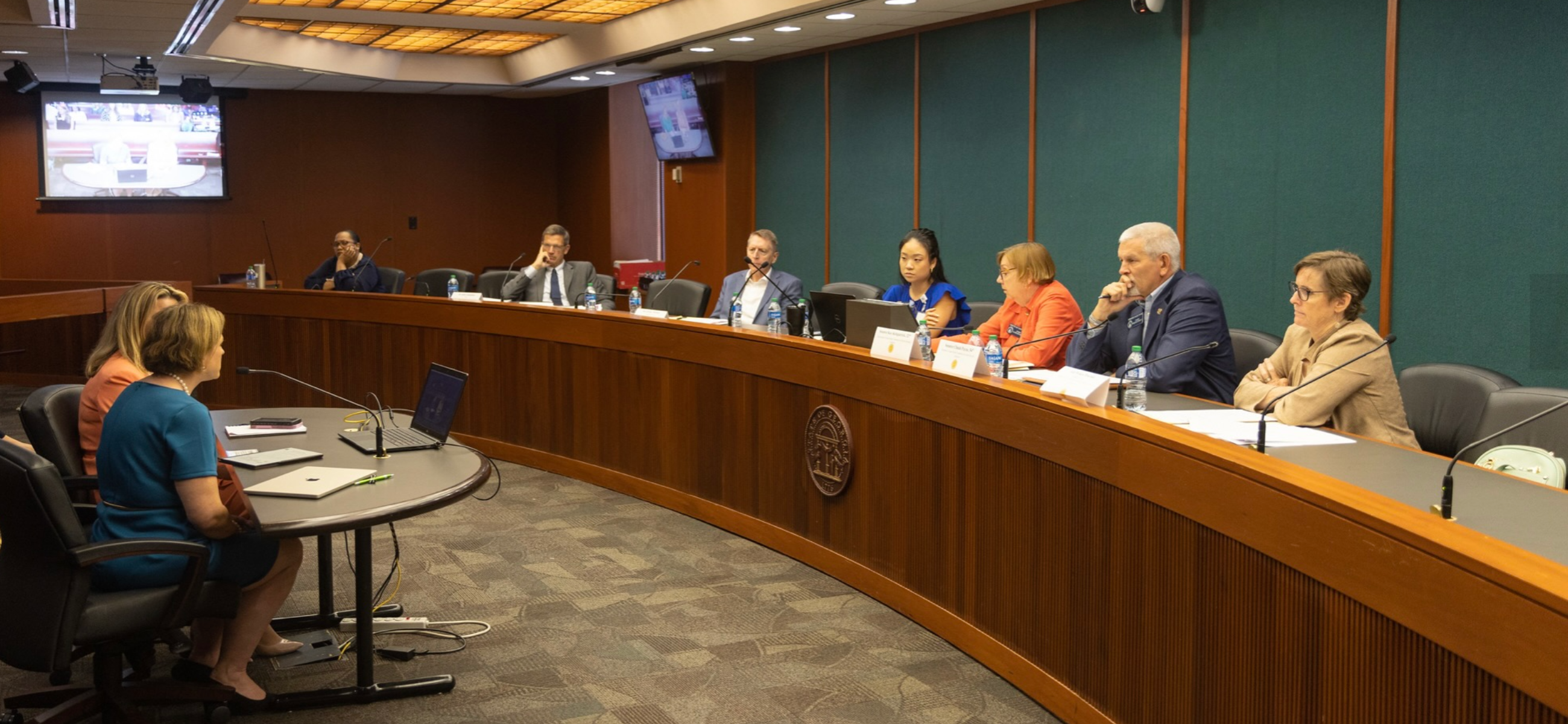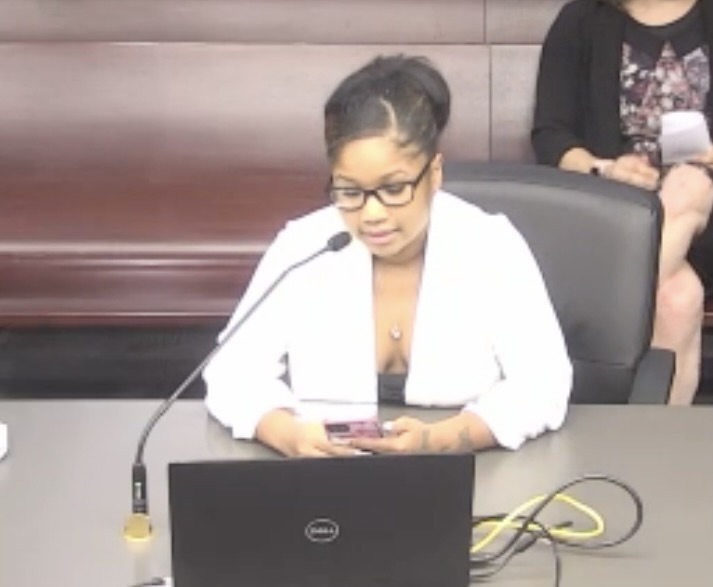Stay ahead of the curve as a political insider with deep policy analysis, daily briefings and policy-shaping tools.
Request a DemoSenate study committee hears suggestions to improve Georgia foster care

The Senate Study Committee on Foster Care and Adoption held their second meeting at the Capitol to hear testimony from citizens, nonprofits and state agency representatives. (Credit: Georgia Senate)
The Gist
ATLANTA — College-bound Halle Mickel gave state lawmakers on Tuesday a compelling glimpse into Georgia’s foster care system.
The 19-year-old who has seven siblings in five different homes told the Senate Foster Care and Adoption Study Committee how her family’s life has been “turned upside down” ever since they were separated last April. She sees her siblings once a week. Sometimes, those visits are canceled because child welfare workers aren’t prepared, she said.

“The pain it caused not only my mom but me felt horrible,” she said. “Watching them cry as they have to leave my mom and go home to a stranger. Seeing my siblings not getting the proper hygiene care they need and so much more. Like many others, my family has been torn to pieces by the child welfare system due to struggling with poverty and being in need of immediate help. Parents aren’t always at fault when DFCS is involved.”
Mickel’s story was included among more than four hours of testimony from advocates and experts in the foster care, child welfare and family court fields. Tuesday’s session focused primarily on finding solutions for Georgia’s taxed foster care system.
What’s Happening
Georgia has about 11,000 children in foster care, committee chair Sen. Kay Kirkpatrick told State Affairs in a post-hearing interview Tuesday. Many are in the system due to abuse, neglect, family drug addiction, violence and other hardships.
Georgia’s foster care system is stretched so thin that children in foster care in Georgia spend about two years in the system — nearly three months longer than the national average of 21.7 months, according to The Council of State Governments Southern Office.
Often there aren’t enough families to take in children so many end up in hotels or offices as a result, Candice Broce, head of Georgia Family and Children Services, recently told the committee.
Broce was back before the committee Tuesday with good news. The foster care system reached a milestone on Sept. 8, when no foster children were reported staying in hotels or offices, she said. Since then, the agency has only used hoteling in a few emergency cases, she noted.
Still, Tuesday’s testimonies showed Georgia is spending more money troubleshooting and intervening rather than preventing children from having to go into the foster care system.
About $538 million in state and federal money is spent on Georgia’s foster care system. The bulk of that — $498.5 million — goes to intervention and late intervention programs, according to Voices for Georgia’s Children, a nonprofit child policy and advocacy group.
“In Georgia, we allocate around 20% of Title IV funding towards prevention while the majority of resources are funneled into the foster care and adoption industry,” said Sarah Winograd of Together With Families, an advocacy group for families in the child welfare system.
“While the majority of the resources are funneled into the foster care and adoption industry,” Winograd told the committee. “It’s an industry. Consider the numbers: a staggering $32,000 per year to keep one child separated from their family and in foster care.”
It costs her organization “a mere $500 to $1,500 per child in assistance and resources at Together with Families to prevent foster care and help families improve their own lives,”she said.
Why It Matters
The committee heard suggestions to help Georgia focus more on prevention rather than intervention. Among the suggestions:
- Issue state identification cards to foster children. Often kids are removed from their homes during chaotic situations leaving birth certificates and other import documents unavailable to them. Children would be issued a state ID within 90 days of entering the foster care system, displaying information such as the child’s Medicaid number. It would enable older children in the system to get jobs and perform other vital daily tasks. The cost would run about $5 a child. “That should be something that’s not too difficult to achieve,” Kirkpatrick said.
- Use the Safe Babies approach in Georgia courts. Between 2011 and 2018, Georgia saw a 44% increase in infants and toddlers entering foster care, more than any other Southern state. As a result, it needs a more collaborative, family-based approach to dealing with the youngest children in foster care, such as the Safe Babies approach used in Iowa. Iowa’s infant courts are adorned with quilts, diapers, toys and books, to help alleviate the trauma experienced by toddlers and infants in the court system. In a recent visit, Georgia officials saw how one Iowa judge, his court staff and attorneys dealt with a mother who became distraught during the hearing. The judge stopped the hearing, allowing attorneys and other staff to embrace the woman. The DFCS case manager and defense attorney told the woman they were there to help her figure out ways to keep her baby. “That’s super important. It’s been successful in other states,” Kirkpatrick said.
- Use opioid settlement money to finance foster care needs. Kirkpatrick called it a good idea but “it might not be that easy to accomplish. It’s not really under the legislature’s control.”
What’s Next?
Kirkpatrick, a Republican and retired orthopedic surgeon who practiced in metro Atlanta for over 30 years, called Tuesday’s hearing extremely productive.
“I thought it was another great meeting,” she said. “We work pretty hard to get input from all the different groups. We won’t make our decisions about which things to tackle until we finish [all of] our meetings. We have one more where we’ll be getting some testimony.”
The senate committee’s next meeting is in Columbus on Oct. 26. It will focus on adoption.
“After that, we’ll get together and figure out what our legislative priorities are going to be,” Kirkpatrick said.
Want to know how many foster children have been placed in foster homes outside of your county? Go to seetheneed.org to find out. See The Need was created by Alpharetta-based FaithBridge Foster Care to raise awareness about foster care in America.
Have questions, comments or tips? Contact Tammy Joyner on X @lvjoyner or at [email protected].
X @StateAffairsGA
Instagram@StateAffairsGA
Facebook @StateAffairsGA
LinkedIn @StateAffairs
Header image: The Senate Study Committee on Foster Care and Adoption held their second meeting at the Capitol to hear testimony from citizens, nonprofits and state agency representatives. (Credit: Georgia Senate)
Professionals still face licensing delays amid state’s transition to online system
The Gist Georgia’s professionals and business owners are still struggling to obtain professional licenses in a timely manner. As the Secretary of State’s Office rolls out its new Georgia Online Application Licensing System to expedite the process, the efficiency of this new process is being put to the test. What’s Happening Thursday morning at the …
Controversy over AP African American Studies class grows
Rashad Brown has been teaching Advanced Placement African American Studies at Atlanta’s Maynard Jackson High School for three years. He’ll continue to do so — even though the state’s top education official removed it from the list of state-funded course offerings for the upcoming school year. While Brown prepares to start teaching his class on …
Students, teachers, lawmakers blast decision to end AP African American history classes
ATLANTA — A coalition of lawmakers, civil rights leaders, clergy, educators and students Wednesday called on the state’s education czar to rescind his decision to drop an advanced placement African American studies class from the state’s curriculum for the upcoming school year. “This decision is the latest attack in a long-running GOP assault on Georgia’s …
Kamala Harris’ presidential bid reinvigorates Georgia Democrats
Georgia Democrats have gained new momentum heading into the November election, propelled by President Joe Biden’s decision to bow out of his reelection bid and hand the reins to Vice President Kamala Harris. The historic decision, announced Sunday, is expected to prove pivotal in the national and state political arenas and breathe new life and …




